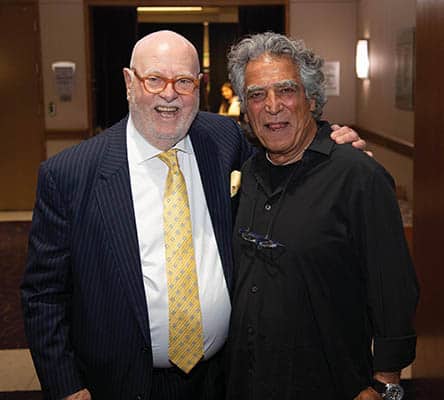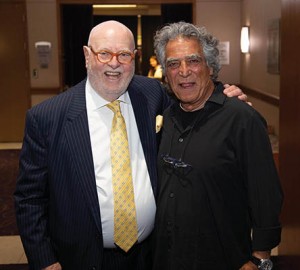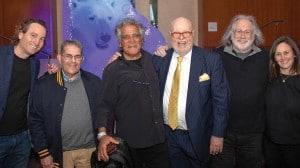Great stories have the power to fuel and feed people. Epic ones grab your attention and hold it until your mind’s altered and your heart’s pounding. That lust for transformation never dies and was the driving force behind the 2020 Virginia Festival of Jewish Film.
Films chosen reflect tension between the community’s desire for contemporary, progressive material and familiar content that makes a soul connection. The 2020 lineup explored evergreen subjects such as Holocaust survivor stories and romantic love at any age. It also delivered a Hollywood-style depiction of a vexing issue facing all organized faith groups. The emergent need to break the mold, and morph historic houses of worship into digitally forward community centers became a deeply personal project for a Jewish millennial actor, director, and filmmaker.
The BIG Saturday Night Celebration of Jewish Film and Champagne Reception, in honor of Patricia Ashkenazi, was held at the Sandler Center in Virginia Beach. The featured film, Picture of his Life is a documentary about more than an iconic photographer’s quest to emerge as the first shooter to swim with and capture a polar bear. Picture of His Life has all the elements of a great story: adventure, nature, adrenaline, friendship, family, heartbreak, and addiction.
Away from the cameras, out of the water, and in the presence of humans, photographer Amos Nachoum stole the show.
Nachoum sprinted on stage immediately after the film. He was visibly moved by the presence of people hungry to hear his story. The 69-year-old Israeli ‘soldier of the sea,’ took a seat next to his former student and film director Dani Menkin. The intense and inwardly focused photographer was gone. The off-screen Amos Nachoum radiated a lightness that buoyed the room. The audience felt it before he responded to the first question, posed by a woman in the audience, setting the mood for the entire evening.
“What is your favorite animal?’ she asked.
“YOU:” Nachoum responded, revealing his reflexive instinct to be totally present with humans, as well as the large predatory animals he lives to portray and protect. The audience ate it up.
Mark Robbins is a Portsmouth-based photographer who shoots for Allaboutjazz.com, JazzTimes and DownBeat. Robbins, also co-chair of the Film Festival screening committee, drove to Washington D. C. and met Nachoum at a scuba diving convention before driving him back to Virginia Beach for the BIG Saturday night event. “Amos is magnetic. People love him. The D.C. crowd went wild. And, he really cares about the environment more than anything. We were driving back to the Beach and this woman threw a cigarette butt out of the window. I thought he was going to roll down his window and tell her to go back and pick it up.”
Robbins understands the sharp contrast between Nachoum, the charismatic Israeli, and the intently focused man at work. “When I’m at a gig, I’m way more outgoing. I’m very introverted naturally. When he’s at work, he’s heavy. But his work is life and death. The worst that can happen to a guy photographing jazz musicians,” says Robbins, with a wink, “is that someone gets some bad weed.”
People thought that dedicating a career to shoot a polar bear was crazy. Nachoum’s father was not his biggest champion. Far from it.
Director Aaron Wolf also understands proof of concept challenge. “When the community first heard about a documentary that chronicled the revival of a faded Los Angeles landmark, they thought it was stupid and said, ‘Why would anyone care?’ The Wilshire Boulevard Temple was the most expensive synagogue renovation ever proposed. An investment of any type in a disenfranchised sanctuary with plaster falling on people trying to pray made no sense. That didn’t stop a visionary rabbi from raising funds, or Wolf, a millennial film director, from giving the religious relic a second chance in the modern world. “My job is to make people care,” says Wolf, “If we do it, it will live forever. I’ve always been a doer. Just talking about things goes up in the air and does nothing.”
Restoring Tomorrow sent a clear message.
What was a faded façade is now a fully restored sanctuary and emerging cultural center with schools, camps, and medical resources available to an entire community. “It’s definitely on its way up. We’re always adding new pieces to the foundation. We’re always striving to make it the best version of our original goal,” says Wolf.
“It impacted my Jewish journey big time. This is a place where my grandfather was a prominent rabbi and I took it for granted. I went from totally disconnected to full immersion. Now I’m planning events and attending events, raising money for camps, and speaking. Sometimes I have to tell myself, ‘ok, Aaron, slow it down, it’s time for a temple break.”
At 34, Wolf recognizes how people his age connect, whether it’s with a church or temple, or business. He’s working on a template for the temple’s digital campus that utilizes platforms like Instagram and TikTok. “You don’t have to be a member of a place, and you don’t have to be physically present to engage and be involved. Getting people to break the mold of just sending letters and e-mails as an engagement tool is a challenge he knows well. “People thought the temple project was dumb at first, but once it came out, the community thought it was a beautiful thing.”
Perhaps Wolf knows his audience.
“When I was in Virginia Beach, two sisters, ages five and seven, came to see the film with their mother. During a bathroom break, they came up to me and the older girl said, ‘Now we want to go do good things in our community.’ The younger one added, ‘yeah, we do!’”
‘You most definitely will,’ I told them.”
Emotional range in all five of the Festival’s films created a need for nuanced settings from intimate (Cinema Café Kemps River, NARO Expanded Cinema and Beach Cinema Ale House,) to larger (Susan S. Goode Fine and Performing Arts Center and Sandler Center for the Performing Arts.) The 2020 line-up included an AARP-ish rom-com, (Love in Suspenders) and vintage goofball comedy (Frisco Kid), to deeply emotional (Those Who Remained), physically and emotionally charged (Picture of his Life), and relevant, redemptive (Restoring Tomorrow).
Anne Fleder attended four of the five films. She liked the unique way in which Those who Remained delivered its message about hope and renewal of faith. “The film is about an unlikely friendship between a young girl who lost her mom, dad, and sister, and a doctor who also lost his entire family,” says Fleder. “They find common ground and their quirky, unique bond reminded us how the human spirit can bounce back, even after the unspeakable happens.”
What was a school project for Cox High School freshman Lizzie Goldstein, became an emotional and personal message that propelled her forward as the first place winner in the multimedia category of the 2019 Elie Wiesel Visual Arts competition.
Goldstein’s short film Stronger than Hate, was recorded at Congregation Beth El and previewed at the showing of Those who Remained on February 26. Last year, the Plaza Middle School student rallied friends and students of all ethnicities and faiths, from different schools and states to convey the message “We are Stronger than Hate.” Her film was inspired by the Tree of Life killings in Pittsburgh. “I wasn’t planning on entering it in a contest, but once I saw how good it was, I decided to submit,” says Goldstein. “I wanted it to stand out. It meant a lot to me that so many different people came together for something so special. When it won, I called each participant and thanked them. They felt like they won a piece of it too.”
Amos Nachoum, neglected son and planet protector, calls himself a ‘soldier of mother nature.’ The scars on his soul from what he witnessed in the Yom Kippur war inspire him to look at life differently. “Look at beauty, rather than misery.”
– Lisa Richmon
One of the longest running Jewish film festivals in the nation, the Virginia Festival of Jewish Film is presented by Patricia and Avraham Ashkenazi and Alma and Howard Laderberg.



